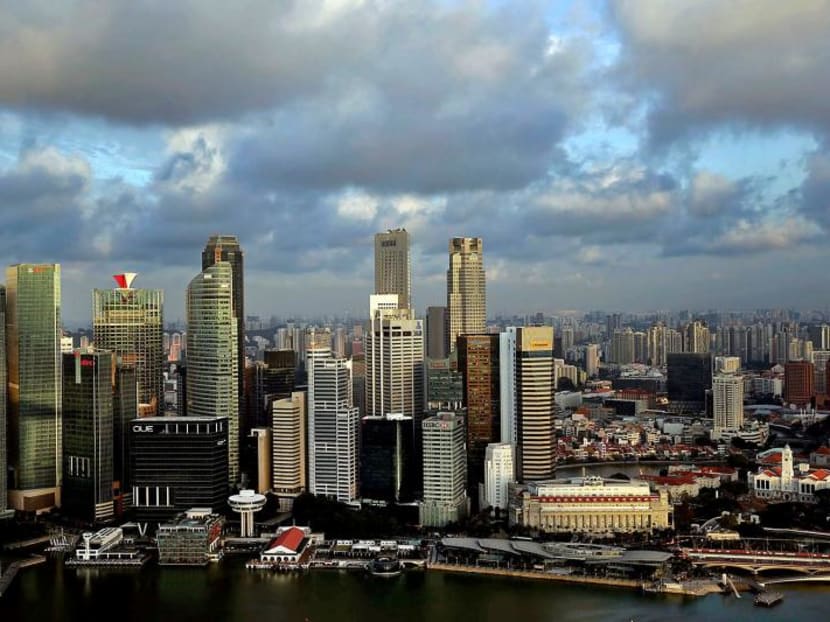‘No light at the end of the tunnel’, say economists as Singapore slashes 2019 trade forecast
SINGAPORE — Grim second-quarter export numbers, coupled with a downgrade in the official forecast for the year, have all but dashed economists’ hopes for a turnaround in Singapore’s trade outlook.

Economists expect the weakness in non-oil domestic exports, and particularly in electronics, to persist into 2020.
SINGAPORE — Grim second-quarter export numbers, coupled with a downgrade in the official forecast for the year, have all but dashed economists’ hopes for a turnaround in Singapore’s trade outlook.
Trade agency Enterprise Singapore said on Tuesday (Aug 13) that total non-oil domestic exports for the year is projected to contract by 8 to 9 per cent, after slumping 14.6 per cent in April to June from the same period a year ago.
In May, the agency had forecast non-oil domestic exports to remain flat or shrink by up to 2 per cent for the full year.
Maybank Kim Eng's economist Chua Hak Bin said that the downgraded forecast was a “more realistic assessment” of the trade situation.
“There is still no light at the end of the tunnel,” he said.
The trade war between the United States and China, coupled with the maturing of the global technology cycle, have led to weaker demand for electronic products, which in turn is hurting Singapore’s electronic exports, he and other economists said.
Based on data from Enterprise Singapore, electronic exports dropped 26.9 per cent in the second quarter of this year, compared with the same period a year ago.
Non-electronic exports also declined, by 10.5 per cent over the same period.
A REALITY CHECK
While several economists had earlier hoped for a recovery in the second half of this year, the escalation of the trade war between the US and China have made this all but impossible, they said.
The US recently announced that it will impose another 10 per cent in tariffs on US$300 billion worth of Chinese goods, which led to China weakening its yuan in retaliation.
Economist Song Seng Wun from CIMB Private Banking said: “The expectation of a bottoming-out and sequential recovery towards the end of the year has all but disappeared. Hence the cut in exports forecast. It’s a reality check.”
It was no surprise that the electronics cluster would come off from its cyclical peak in the first half of last year, but the decline has been exacerbated by the eruption and worsening of these trade tensions, economists added.
Mr Rajiv Biswas, Asia-Pacific chief economist at research firm IHS Markit, said: “The smartphone cycle was very strong in 2017. New smartphones issued by Samsung and Apple that year were major upgrades, there was strong demand for those, which ran into early 2018 as well.
“That turned down since the middle of 2018 because of saturation of the smartphone market and slowdown of consumer spending in China.”
Mr Rajiv said that it is not just the decline in electronics exports that is worrying, since it was more or less anticipated by the market.
“What’s of concern is that non-electronic products also recorded negative growth,” he added.
In particular, petrochemical exports, which is an important cluster for Singapore, registered a fall of 15 per cent in the second quarter from the same period a year ago.
WEAKNESS TO PERSIST IN 2020
Several economists expect the weakness in non-oil domestic exports, and particularly in electronics, to persist into 2020.
Forward-looking indicators, such as July’s Purchasing Managers’ Index — a measure of manufacturing activity — “continue to suggest that the underlying growth momentum is likely to weaken,” Mr Song said.
The sharp slowdown in exports has also been dragging down Singapore’s economy, economists say.
The Ministry of Trade and Industry (MTI) on Tuesday downgraded its growth forecast for this full year to between zero and 1 per cent, from an earlier projection of between 1.5 and 2.5 per cent. This is the second downgrade made by the MTI this year, after it slashed its projection for the economic outlook in May.
The ministry also said that the Singapore economy in the second quarter grew 0.1 per cent from the same period a year ago, the slowest since the 2008 global financial crisis.
While Dr Chua expects a weak recovery in 2020 due to the low base this year, he said that this is predicated on the outcome of trade war negotiations between the US and China.
“Even a stalemate is a better outcome than a worsening,” he said.
Mr Gerald Wong, the head of Singapore research at Credit Suisse, said: “As it stands today, if there is no resolution of trade tensions, it will still likely remain weak as headwinds persist into 2020.”








